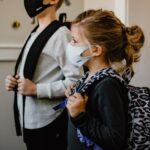With more states across America ordering millions to stay home, and Britain joining the rest of Europe in shuttering nonessentialbusinesses and placing its population under what one newspaper called “house arrest”, voices of disquiet over the economic cost of suchmeasures grew louder, even as public health experts warned that relaxing restrictions could significantly increase the death toll.
Only one week after the White House released guidelines for all Americans to keep their distance, President Trump said it could soon betime to consider a more targeted approach.
Life is fragile and economies are fragile,” the president said on Monday. “America willagain and soon be open for business.
Millions have already lost their jobs and the foundations of the global economy have been shaken. Mortgage markets showed signs ofcrumbling, companies struggled to sell debt and stresses plagued the entire financial system.
The Federal Reserve promised to buy as much government-backed debt as needed to bolster the markets on Monday, but stocks on Wall Streetstill fell.
There were hopeful signs on Tuesday, however, as Wall Street made early gains after Asian and European markets rebounded smartly.Lawmakers in Washington expressed optimism that they would reach a deal on a nearly $2 trillion stimulus bill. Public health officialscontinued to warn of impending disaster in the absence of stronger restrictions on movement, saying the uncontrolled spread of the viruscould overwhelm health care systems around the world.
To all of my friends and colleagues in New York, this is the group that needs toabsolutely social distance and self-isolate at this time
Across the Atlantic, even as the crisis grew in Spain and France and Britain prepared for worse days to come, health officials couldpoint to the first glimpses of hope. Two weeks after Italy was completely locked down, its number of new cases and deaths declined for twodays in a row. The number of patients in the hospitals in Lombardy, the region that is by far the hardest hit in Italy, fell as well, to9,266 from 9,439.
We can say that today is the first positive day, said Giulio Gallera, Lombardy’s leadinghealth official. “It’s not the moment to sing victory, but we finally see light at the end of the tunnel.
The Spanish army has found elderly people abandoned in several nursing homes, raising alarm for those most vulnerable and in need ofcare with much of life in the country shut down. The government will be “forceful” in its response to those who abandon older people,Margarita Robles, Spain’s defense minister, said Monday in an interview with Telecinco, a Spanish television channel. Officials did not sayhow many had died or whether residents had succumbed to coronavirus-related illness or a lack of care.
Ms. Robles said that emergency military units dispatched to disinfect nursing homes had found there some residents “absolutelyabandoned, if not dead in their beds.”
The defense ministry said that dead bodies had been found in multiple nursing homes that had discharged large number of employees in thewake of the outbreaks, but did not provide further details, El Pais, a daily broadsheet, reported.






